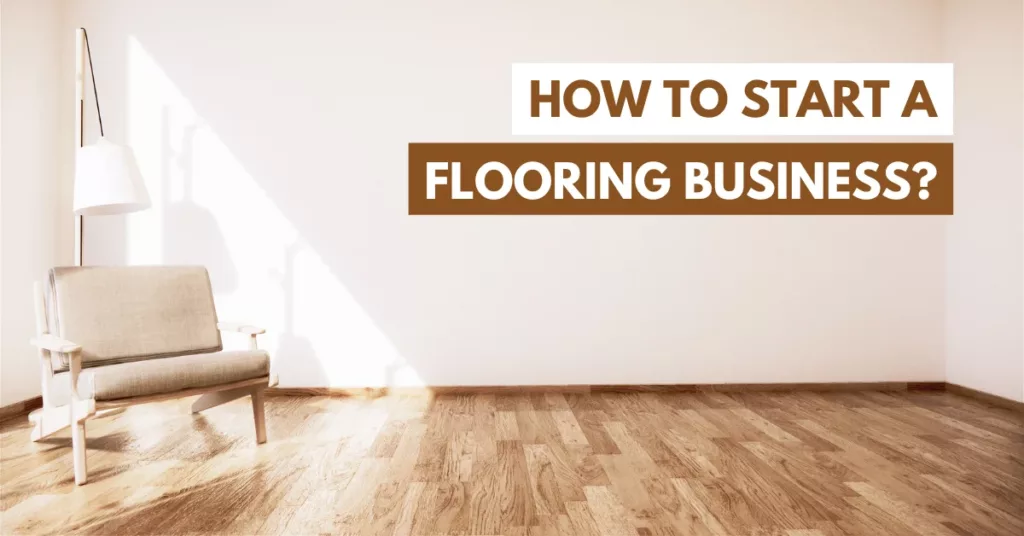Imagine entering a room, and the flooring beneath your feet immediately catches your eye—not the furnishings or the décor, but the sheer elegance and skillful design. With skillful installation, the soft beauty of hardwood, the coziness of carpeting, or the sleek allure of vinyl can all convert a room into a welcoming sanctuary.
This blog will give tips for transforming your love of flooring into a successful business endeavor. How to start a flooring business? Starting a flooring business is like having the keys to unlock the potential of every area. Enter the business realm now, where each step will create the groundwork for your future success in the flooring field.
What are the First Stages of Launching a Flooring Company?
How to start a floor installation business? Careful preparation and execution are required when creating a flooring business. The first actions to help you through the procedure are listed below:
1. Market Analysis
- Start by carrying out in-depth market research. Decide who your target market is, which could be either commercial or residential, or both.
- Examine the local and regional demand for flooring services as well as the local competition. Consider their advantages and disadvantages.
- Recognize market trends, pricing schemes, and client preferences about flooring.
2. Business Strategy
- Make a thorough business plan that details your company’s objectives, tactics, and financial projections. Include information on your target market, marketing strategy, spending plan, and finance needs.
- A thorough business plan is necessary for securing funding and directing the expansion of your company.
3. Legitimate Concerns
- Select a business legal structure appropriate for it, such as a corporation, LLC, or sole proprietorship. Consult with legal and financial experts to choose the best action for your situation.
- Register your company with the relevant governmental agencies and acquire any necessary licenses or permissions.
- Get liability insurance to safeguard your company’s assets in the event of accidents or legal challenges.
4. Planning Your Finances
- Make a thorough financial strategy that details startup expenditures, ongoing costs, and revenue estimates.
- Get the money you need to meet startup expenditures, including buying equipment, getting a car, paying for marketing, and having some working capital.
- Open a particular business bank account to keep your personal and corporate finances distinct.
5. Utensils and Tools
- Determine the essential tools and equipment required for your flooring business. Some examples of these might be saws, sanders, installation tools, measurement devices, safety equipment, and vehicles.
- To ensure effective and expert workmanship, spend money on high-quality tools and equipment.
6. Supplier Connections
Make connections with reputable flooring material distributors and suppliers. Make sure they have a reliable supply of high-caliber flooring products.
To maximize your company’s profitability, bargain with suppliers for favorable terms and prices.
7. Marketing and Branding
- Create a strong brand identity with a recognizable company name, logo, and expert website. To draw customers, you must have a strong internet presence.
- Make a marketing strategy that includes tactics for both offline and internet advertising.
- Network with nearby contractors, realtors, and interior designers to establish connections and receive recommendations.
8. Customer Support and Quality Control
- To guarantee client happiness put quality control and customer service policies into practice.
- To control consumer expectations, provide warranties on your work and precise estimates.
9. Business Address
- Choose whether to work as a mobile flooring contractor or run your business out of a dedicated showroom. Take your target market’s costs, logistics, and convenience into account.
10. Employment and Training
- If necessary, hire qualified personnel or service providers with flooring installation knowledge and related tasks.
- Invest in training and certification programs for you and your team to keep up with market best practices.
How Do I Pick the Best Quality Flooring Materials for My Company?
How to start an epoxy flooring business with the best quality materials? Making the appropriate flooring material choice for your company is an important choice that can affect both your success and consumer pleasure. Think carefully about the following elements to make an informed decision.
1. Recognize Your Market
Learn about your target market first. Are you primarily serving consumers at home, or are you also serving businesses? Different preferences and needs for flooring materials may exist within each market group.
2. Traffic and Durability
Consider how much foot activity and how much abrasion your flooring will take. High-traffic locations, such as crowded homes or commercial buildings, call for resilient flooring materials that sustain constant use.
3. Budgetary Limitations
Set a spending limit for flooring supplies. Striking a balance between quality and cost is vital because certain materials are more affordable than others.
4. Beauty Appeal
Think about the overall look you want to accomplish. Styles, colors, and textures differ among various flooring materials. Make sure the option you choose fits the target audience’s taste in design.
5. Requirements for Maintenance
Consider the upkeep requirements of the flooring materials. While some alternatives are low-maintenance and simple, some may need routine sealing, waxing, or special cleaning.
6. Effect on the Environment
Given the increased environmental consciousness among consumers, many choose eco-friendly flooring solutions. To meet this desire, think about providing flooring made from sustainable materials like bamboo, cork, or recycled materials.
7. Acoustics and Comfort
Consider the flooring’s level of comfort and acoustic qualities. For instance, hardwood has a classic style but may be noisier, whereas carpet offers warmth and sound insulation.
8. Resistance to Moisture
Examine the installation area’s moisture levels. Due to their resilience to moisture, materials like ceramic tile or luxury vinyl may be more appropriate in damp or humid situations.
9. Allergies and Health
Take into account your consumers’ health and allergy worries. Flooring surfaces like hardwood or tile are less likely to retain allergies than carpets.
10. Local Weather
The local climate might impact the appropriateness of flooring materials. Extreme temperature variations may cause some materials to expand or contract, which might cause problems.
11. Continuity of Value
Consider the long-term benefits that your flooring choice brings. Although initial prices are crucial, consider elements like longevity and possible resale value when choosing.
12. Guidelines and Codes
Especially in commercial settings, be aware of local building standards or regulations that may specify specific flooring materials for particular applications.
13. Consultations with Clients
When working with clients, engage in a consultation process to comprehend their unique demands, preferences, and spending limits. Provide knowledgeable advice and suggestions based on their needs.
How to start a flooring installation business? By carefully weighing these factors, you may make judgments that result in effective flooring installations and delighted clients.
What Qualifications or Training Are Essential to Install Flooring Professionally?
How to start a floor cleaning business? You should obtain qualifications and complete pertinent training to install flooring and guarantee the caliber of your work professionally. The precise criteria may change depending on your area, the sort of flooring you intend to install, and your consumers’ expectations. Consider the following training courses and certifications
1. Installers of Certified Flooring (CFI)
Carpet, vinyl, hardwood, laminate, and ceramic tile are just a few of the flooring kinds for which CFI offers thorough training and certification programs.
2. The NWFA (National Wood Flooring Association)
For the installation and upkeep of wood flooring, NWFA provides a range of training programs. Their Certified Professional Installer (CPI) program is well acclaimed in the industry.
3. North American Tile Council (TCNA)
TCNA offers training and certification to install ceramic and stone tiles. This company’s Certified Tile Installer (CTI) program evaluates the abilities and expertise required for high-quality tile work.
4. Regulations and Local Licencing
To legally provide flooring installation services, it may be necessary to obtain a contractor’s license in your area. For requirements, check with your neighborhood licensing board.
5. Safety Education
OSHA (Occupational Safety and Health Administration) training could be required, especially for business projects. OSHA training ensures that you and your team follow safety regulations on construction sites.
6. Programs for Apprenticeship
Take advantage of the apprenticeship and mentoring possibilities provided by seasoned flooring specialists. The development of skills can benefit significantly from these practical experiences.
How Can I Keep Satisfied Customers?
How to start a epoxy flooring business with satisfied customers? In the flooring industry, ensuring customer satisfaction is essential for developing a good reputation, obtaining recurring business, and generating referrals. Here is a thorough guide to increasing and sustaining high levels of client satisfaction.
1. Successful Communication
- Establish open channels of communication with your clientele to start. Pay close attention to their wants, preferences, and worries.
- Throughout the project, give clients regular updates so they know the status, any unforeseen problems, and the projected completion date.
2. Specifications and Contracts
- Create comprehensive bids and contracts that include information on all project requirements, such as materials, labor costs, deadlines, and terms of payment.
- Make sure all potential additional costs that might occur during the project are disclosed.
- exemplary craftsmanship
- Deliver top-notch craftsmanship throughout the installation procedure. Prepare surfaces properly, make accurate cuts, and ensure smooth and straight installations.
- For each type of flooring material you handle, adhere to manufacturer recommendations and industry best practices.
3. Observation of Details
- Pay close attention to the little things, such as matching patterns, ensuring everything is aligned correctly, and neatly finishing the borders. These minute touches have a significant effect on how the flooring looks overall.
4. Professionalism
- When speaking with clients, keep a professional demeanor and appearance. It’s crucial to be reliable, attend appointments on time, and finish tasks by the deadline.
5. Keeping the Workspace Safe
- Take precautions to safeguard the client’s assets and possessions while the installation is being done. Cover furniture with drop cloths, make sure there is little dust or dirt, and use drop cloths.
6. Cleanliness
- Maintain a tidy and organized work environment. Maintain a regular trash cleanup and proper garbage disposal. Professionalism is reflected in a clean workplace.
7. Good Materials
- Use flooring materials and adhesives of the highest caliber that meet or surpass industry standards. Make sure supplies are handled and kept correctly to avoid harm.
8. Resolving the Issue
- Any problems or complaints should be handled quickly and professionally. Problems must be solved in a way that puts the client’s interests and satisfaction first.
9. Education and Counselling
- Inform customers about how to take care of and maintain their new flooring. Give written or verbal directions on cleaning, supporting, and caring for any special needs for the flooring material you’ve chosen.
10. Quality Assurance Checks
- Implement quality control tests at different points in the project to find problems and fix them before they worsen.
- After the project, conduct a comprehensive inspection with the client to confirm their satisfaction and rectify any unresolved issues.
11. Follow-Up
- Follow up with clients to get their input after the job is complete. It can show your dedication to customer satisfaction and highlight areas that need development.
12. Positive Comments and Recommendations
- Encourage pleased customers to submit reviews or make recommendations. Word-of-mouth referrals and positive comments can help you build a better reputation.
By emphasizing these customer satisfaction factors, you may build a solid reputation for excellence and professionalism in the flooring industry.
Last Note
How to start a flooring business successfully? Success in the complex flooring industry begins with a solid foundation. The detailed insights in the blog above await your study since you’ve already seen the essential procedures and tactics for starting your business.
Frequently Asked Questions (FAQs)
Q: What should a flooring contract contain?
A: A contract should include information about the project’s specifics, schedule, materials, payment terms, warranties, and dispute resolution procedures.
Q: How can I deal with unforeseen flooring problems as they arise?
A: A solution that minimizes delays and extra expenses should be proposed after rapid client communication and problem assessment.
Q: How to start a flooring business as a lone proprietor?A: Although establishing an LLC or corporation may offer legal and financial advantages as your business expands, you can start as a sole proprietor.
How to Start a Photobooth Business



